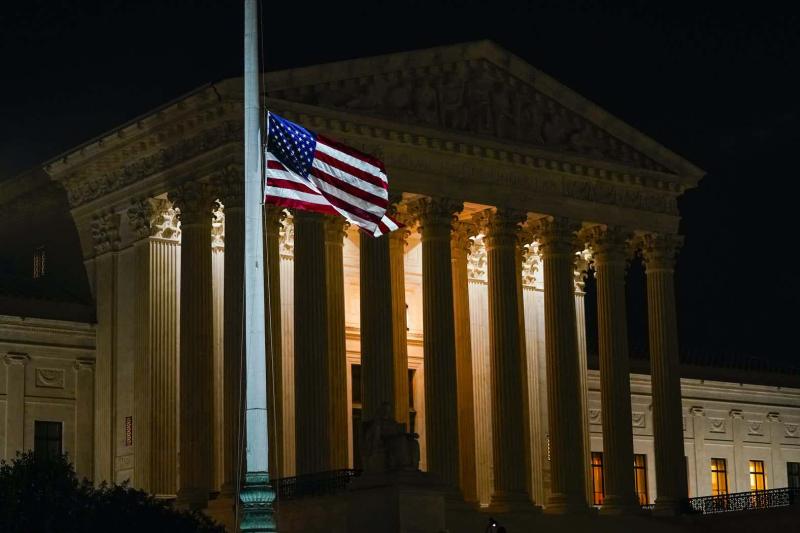A true champion of justice'



The word of Justice Ruth Bader Ginsburg’s death spread fast across Indian Country. Tribal leaders, officers of the law, and citizens celebrated her life and expressed fears for the future.
Navajo Nation President Jonathan Nez said that Ginsburg left behind a great legacy. “She was a true champion of justice. Her compassion for all people will always be cherished. We are stronger because of her contributions to the Supreme Court and Indian Country.”
Bay Mills Indian Community Chairman Bryan Newland tweeted that a “magnificent woman has died this evening. Take a moment to honor her life, her humanity, and your own humanity. There's no shortage of politics and cynicism in our nation. There's not enough humanity.”
Stacy Leeds, Cherokee, who is Dean Emeritus and a law professor at the University of Arkansas shared, "Justice Ginsburg was incredibly smart and brave. She carried immeasurable stress with such grace. That’s why so many Native attorneys held her in very high regard, despite her mixed record in Indian law cases. Her vote to reaffirm Muscogee (Creek) Nation boundaries on the final day of her final term will long be remembered.”
Later in the evening, the National Congress of American Indians also weighed in on the passing of Ginsburg. NCAI President Fawn Sharp said the Supreme Court Justice was a champion for the rights of all people.
Chief Justice John Roberts mourned Ginsburg’s passing. “Our Nation has lost a jurist of historic stature. We at the Supreme Court have lost a cherished colleague. Today we mourn, but with confidence that future generations will remember Ruth Bader Ginsburg as we knew her — a tireless and resolute champion of justice,” Roberts said in a statement.
The fight for a replacement on Capitol Hill has already started.
Senate Majority Leader Mitch McConnell refused to act on Obama's nomination of Judge Merrick Garland to fill a court opening in 2016. The seat remained vacant until after Trump's surprising presidential victory. McConnell has said he would move to confirm a Trump nominee if there were a vacancy this year.
Reached by phone late Friday, Sen. Lindsey Graham, R-S.C., the chairman of the Judiciary Committee, declined to disclose any plans.
He called Ginsburg a “trailblazer” and said, “While I had many differences with her on legal philosophy, I appreciate her service to our nation.”
Top Senate Democrat Chuck Schumer tweeted: “The American people should have a voice in the selection of their next Supreme Court Justice. Therefore, this vacancy should not be filled until we have a new president.”
Alaska Sen. Lisa Murkowski, a Republican, tweeted that she will not vote to replace Ginsburg until after the election. "Fair is fair," she said.
Ginsburg’s record on federal Indian law
A law review article published by Carole Goldberg, published in 2010 by the Native American Rights Fund, explored Ginsburg’s ruling on federal Indian legal issues.
She cited the case, City of Sherrill, as evidence that did not “get” Indian law at all and that she was fundamentally unsympathetic to tribal claims. Ginsburg has said that she regretted her role in that case, “more than any other case.”
However in more recent cases Ginsburg was much more aligned with tribal views. She sided with the majority in the McGirt v Oklahoma case as well as the Crow tribe hunting case, Herrera v. Wyoming .
Both cases strongly supported the ideas that treaties meant what they said and are the law of the land.
In another recent case, Terry Anderson wrote an op-ed praising Ginsburg and Justice Neil Gorsuch for working together to protect individual rights. “Justice Ginsburg joined Justice Gorsuch and three other liberal colleagues in supporting the individual rights of the Yakama Nation in the Washington State Department of Licensing v. Cougar Den, Inc taxation case,” he wrote in Indian Country Today. “Cougar Den is significant because recognizes the importance of individual freedom for Native Americans. Whether conservative, liberal, or libertarian, justice begins with the individual.”
At a conference in May, Ginsburg told the Buffalo Chronicle that the time might be right for a Native American to serve on the court. At the conference in Buffalo a former clerk of Ginsburg’s told the newspaper: “So much justice has been denied to Native American communities because they have not had a seat at the table.”
Other Indigenous leaders took to social media to offer their condolences:

Jackie Fielder , Mandan, Hidatsa and Arikara Nation :
“Back in May, RBG wanted Trump to appoint a Native American woman to the Supreme Court. Let’s hope that her vacancy isn’t filled until we get a new president. As always, we continue fighting.”
—
Rep. Deb Haaland of New Mexico, Laguna and Jemez Pueblos:
“A fierce fighter for justice and equality, Ruth Bader Ginsberg will live on. I promise to do all I can to honor her good and virtuous life's work.”
—

—
Pauly Denetclaw, Diné :
“RBG was a strong woman who held on for as long as she could. Praying for her journey into the next world and for her family during this transition.”
—
Minnesota Lt. Gov Peggy Flanagan, White Earth Nation:
“In her legal career and her tenure on the Supreme Court, Ruth Bader Ginsberg was a champion for women in the workplace, in health care, and as equal partners in our country’s future. We are all better because of her. I am devastated by her loss.”
—

—
Rory Wheeler, Seneca Nation:
I’m so saddened to learn of the passing of Supreme Court Justice Ruth Bader Ginsburg. Her belief that the constitution “strives for a more perfect union” is one that ensured more pathways to equality and justice for all.
—
Julian Brave NoiseCat, Canim Lake Band Tsq'escen:
“Ok, last thing and then I'm actually logging off: a lot more than Justice Ruth Bader Ginsburg may have just died unless we fight like hell, again.”
10:05 pm ET: This story was updated to add a statement from the National Congress of American Indians
9:26 pm ET: This story has been updated to add comments from Bay Mills Indian Community Chairman Bryan Newland and Stacy Leeds






A law review article published by Carole Goldberg, published in 2010 by the Native American Rights Fund, explored Ginsburg’s ruling on federal Indian legal issues.
She cited the case, City of Sherrill, as evidence that did not “get” Indian law at all and that she was fundamentally unsympathetic to tribal claims. Ginsburg has said that she regretted her role in that case, “more than any other case.”
However in more recent cases Ginsburg was much more aligned with tribal views. She sided with the majority in the McGirt v Oklahoma case as well as the Crow tribe hunting case, Herrera v. Wyoming .
Both cases strongly supported the ideas that treaties meant what they said and are the law of the land.
Justice Ginsburg recognized and even advocated for a Native American to be selected for the Supreme Court. One reason is that, as she stated above, she "did not "get" Indian law at all. Justice Gorsuch, at the present time, is the only Justice who is very familiar with Federal Indian Law. One of eight does not give the Native Americans a strong chance of winning many of their cases, most of which are based on Treaty obligations. In May of this year, Ginsburg stated that she hoped a Native American would be selected for the Court.
We hope so also Justice Ginsburg.
RIP - and may your crossing be without any boundaries or barriers. Thanks for your intelligence, wit and wisdom - they have done well for us.
Well, zero chance of that right now.
Actually Thrawn - neither administration (Trump/Biden) gives a rats patootie about getting some "education" in Fed Indian Law on the Supreme Court. Without that expertise, the court will continue to rule unfavorably - against treaty language and law - for the Tribes/Nations.
But, ya never know, eh?
Great article 1st from an Indian perspective. She really was a champion for our people. Her loss will be a loss for us.
And while people are already picking over her bones, lest us not forget, that the Court knew how ill she was and said nothing. That tells you how highly they thought of her, be it left or right. Chief Roberts said it well when he said:
When Justice Ginsburg realized her error, she began, I believe, to pay more attention to the cases involving the Tribes/Nations and it definitely showed in the Herrera and McGirt cases.
It is my fervored hope and desire that Justice Gorsuch will be able to start waking some members of the court up so that they may start paying attention to the reality of details and treaties. Yeah - even Kavanaugh .
.